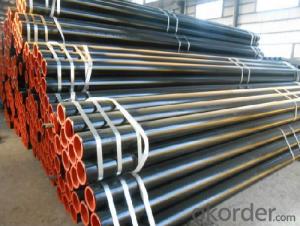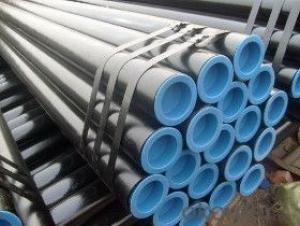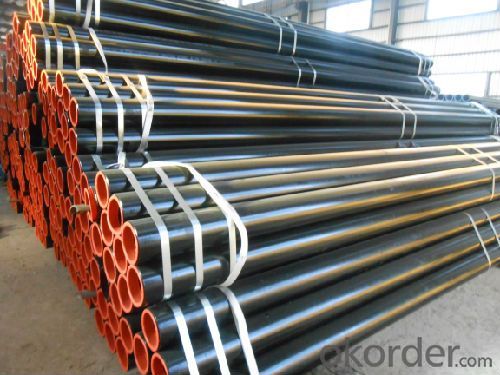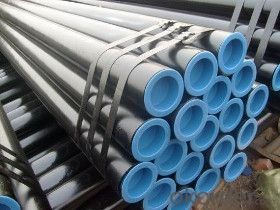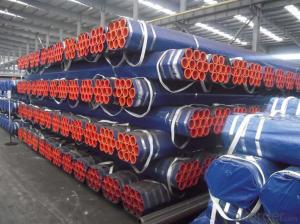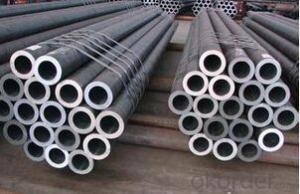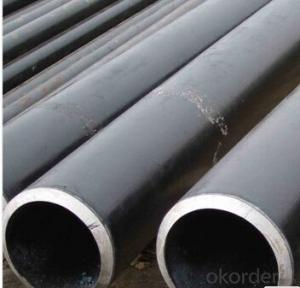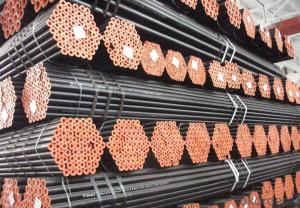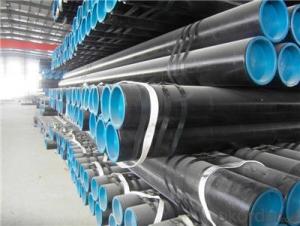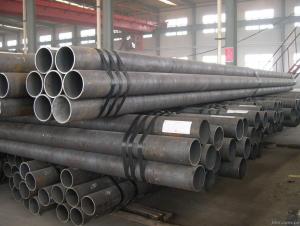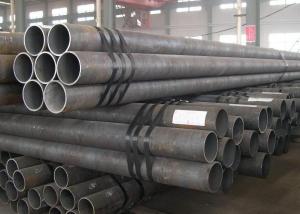Seamless Steel Tubes for Low and Medium Pressure Boiler
- Loading Port:
- Tianjin
- Payment Terms:
- TT OR LC
- Min Order Qty:
- 30 m.t.
- Supply Capability:
- 12000 m.t./month
OKorder Service Pledge
OKorder Financial Service
You Might Also Like
1、Structure of Seamless PipeGB3087:
Seamless pipe is formed by drawing a solid billet over a piercing rod to create the hollow shell. As the manufacturing process does not include any welding, seamless pipes are perceived to be stronger and more reliable. Historically seamless pipe was regarded as withstanding pressure better than other types, and was often more easily available than welded pipe.
Standard: GB3087: Seamless Steel Tubes for Low and Medium Pressure Boiler
2、Main Features of the Seamless Pipe GB3087
• High manufacturing accuracy
• High strength
• Small inertia resistance
• Strong heat dissipation ability
• Good visual effect
• Reasonable price
3、Seamless PipeGB3087:Specification:
Standard | GB, DIN, ASTM ASTM A106-2006, ASTM A53-2007 |
Grade | 10#-45#, 16Mn 10#, 20#, 45#, 16Mn |
Thickness | 8 - 33 mm |
Section Shape | Round |
Outer Diameter | 133 - 219 mm |
Place of Origin | Shandong, China (Mainland) |
Secondary Or Not | Non-secondary |
Application | Hydraulic Pipe |
Technique | Cold Drawn |
Certification | API |
Surface Treatment | factory state or painted black |
Special Pipe | API Pipe |
Alloy Or Not | Non-alloy |
Length | 5-12M |
Outer Diameter | 21.3-610mm |
Grade | 20#, 45#, Q345, API J55, API K55, API L80, API N80, API P110, A53B |
Standard | ASME, ASTM |
4、Packaging & Delivery
Packaging Details: | seaworthy package,bundles wrapped with strong steel strip |
Delivery Detail: | 15-30days after received 30%TT |
5、FAQ of Seamless Pipe GB3087:
①How is the quality of your products?
Our products are manufactured strictly according to national and internaional standard, and we take a test
on every pipe before delivered out. If you want see our quality certifications and all kinds of testing report, please just ask us for it.
Guaranteed: If products’ quality don’t accord to discription as we give or the promise before you place order, we promise 100% refund.
②How about price?
Yes, we are factory and be able to give you lowest price below market one, and we have a policy that “ for saving time and absolutely honest business attitude, we quote as lowest as possible for any customer, and discount can be given according to quantity”,if you like bargain and factory price is not low enough as you think, just don’t waste your time.Please trust the quotation we would give you, it is professional one.
③Why should you chose us?
Chose happens because of quality, then price, We can give you both.Additionally, we can also offer professional products inquiry, products knowledge train(for agents), smooth goods delivery, exellent customer solution proposals.Our service formula: good quality+good price+good service=customer’s trust
SGS test is available, customer inspection before shipping is welcome, third party inspection is no problem.
6、Seamless Pipe GB3087 Images:
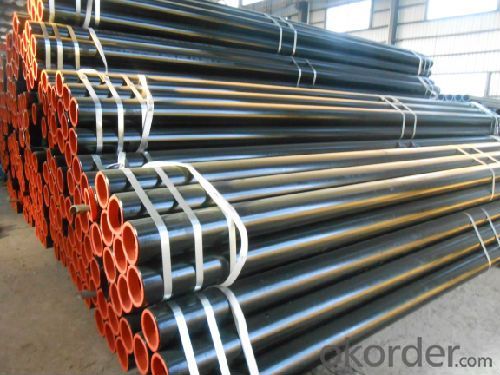
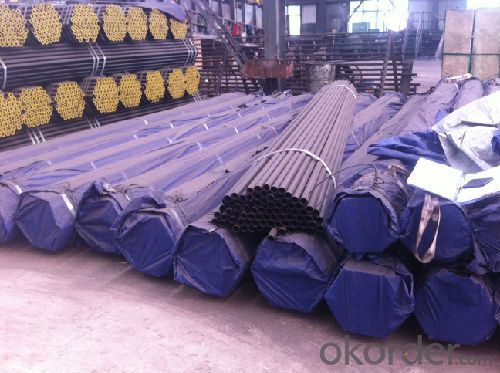
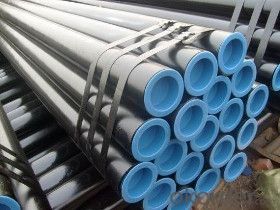
- Q: Can steel pipes be used for airport construction?
- Yes, steel pipes can be utilized in the construction of airports. In the construction industry, steel pipes find widespread application, including in airports. They are often employed for underground utilities like water and sewage lines, as well as for structural purposes such as providing support to the airport terminal building. The utilization of steel pipes for airport construction offers several advantages. Firstly, they possess remarkable strength and durability, making them capable of handling heavy loads and enduring unfavorable weather conditions. This attribute is crucial for ensuring the security and stability of airport structures. Secondly, steel pipes are highly versatile and can be easily tailored to meet specific project requirements. They are available in various sizes and thicknesses, providing flexibility in both design and construction. Moreover, steel pipes can be welded or joined together to form longer sections, which simplifies installation and reduces construction time. Furthermore, steel pipes exhibit resistance to corrosion, a vital characteristic in airports where constant exposure to moisture, salt, and other environmental factors is common. This resistance to corrosion guarantees the longevity and dependability of the infrastructure. Lastly, in comparison to materials like concrete or PVC, steel pipes offer a cost-effective solution. They necessitate relatively low maintenance and boast a long lifespan, thereby minimizing the need for frequent repairs or replacements and ultimately saving time and money in the long term. In conclusion, due to their strength, durability, versatility, corrosion resistance, and cost-effectiveness, steel pipes are a suitable choice for airport construction.
- Q: Can steel pipes be used for swimming pool installations?
- Yes, steel pipes can be used for swimming pool installations. Steel pipes are known for their durability and strength, making them a suitable choice for underground or aboveground swimming pool plumbing systems. They are capable of handling high water pressure and can withstand the corrosive effects of pool chemicals. Additionally, steel pipes are resistant to extreme weather conditions and can be easily installed and maintained. However, it is important to ensure that the steel pipes are properly treated and coated to prevent rust and corrosion.
- Q: What is the difference between seamless and ERW steel pipes?
- Seamless steel pipes are manufactured without any welded joints, resulting in a continuous and strong structure. On the other hand, ERW (Electric Resistance Welded) steel pipes are created by welding the edges of the steel strip together to form a pipe. While seamless pipes offer better strength and durability, ERW pipes are more cost-effective and suitable for less demanding applications.
- Q: How are steel pipes used in the construction of stormwater drainage systems?
- Steel pipes are commonly used in the construction of stormwater drainage systems due to their durability and strength. These pipes are used to convey stormwater from various sources, such as streets and rooftops, to designated discharge points, preventing flooding and directing the water away from structures. Steel pipes are ideal for handling the high flow rates and heavy loads associated with stormwater runoff, making them an essential component in the construction of efficient and reliable drainage systems.
- Q: Can steel pipes be used for underground fuel pipelines?
- Yes, steel pipes can be used for underground fuel pipelines. Steel pipes are commonly used for various types of pipelines due to their durability, strength, and resistance to corrosion. When it comes to underground fuel pipelines, steel pipes are a popular choice due to their ability to withstand high pressure and temperature fluctuations. Additionally, steel pipes provide excellent protection against external elements, such as soil movement or chemical reactions, ensuring the safety and integrity of the fuel transportation system. Proper insulation and coating can further enhance the corrosion resistance of steel pipes, making them a reliable option for underground fuel pipelines.
- Q: Can steel pipes be used for underground sprinkler systems?
- Yes, steel pipes can be used for underground sprinkler systems. However, it is important to note that steel pipes are not as commonly used as other materials like PVC or polyethylene due to their susceptibility to corrosion. If steel pipes are chosen for this application, they should be coated or lined to protect them from underground moisture and ensure their longevity.
- Q: What are the different methods of cleaning steel pipes?
- There are several methods of cleaning steel pipes, including mechanical cleaning, chemical cleaning, and high-pressure water jetting. Mechanical cleaning involves using wire brushes, scrapers, or sandpaper to physically remove debris and rust from the pipe's surface. Chemical cleaning involves using solvents or acids to dissolve contaminants and rust, followed by flushing the pipe with water. High-pressure water jetting uses a stream of water at high pressure to remove dirt, rust, and other deposits from the pipe's interior and exterior surfaces.
- Q: How are steel pipes used in the manufacturing of fire sprinkler systems?
- Steel pipes are commonly used in the manufacturing of fire sprinkler systems due to their durability and resistance to high temperatures. These pipes are used to transport water or other fire suppressants from the water supply to the sprinkler heads. The steel pipes are able to withstand the pressure and heat generated during a fire, ensuring a reliable and effective fire suppression system.
- Q: How are steel pipes used in the construction of airports?
- Steel pipes are used in the construction of airports for various purposes such as drainage systems, fuel pipelines, water supply networks, and structural support for buildings and runways.
- Q: How do steel pipes perform in high-temperature applications?
- Steel pipes perform well in high-temperature applications due to their high thermal conductivity and excellent resistance to heat. They can withstand extreme temperatures without deformation or structural failure, making them suitable for transporting hot fluids or gases in industrial processes.
Send your message to us
Seamless Steel Tubes for Low and Medium Pressure Boiler
- Loading Port:
- Tianjin
- Payment Terms:
- TT OR LC
- Min Order Qty:
- 30 m.t.
- Supply Capability:
- 12000 m.t./month
OKorder Service Pledge
OKorder Financial Service
Similar products
Hot products
Hot Searches
Related keywords
